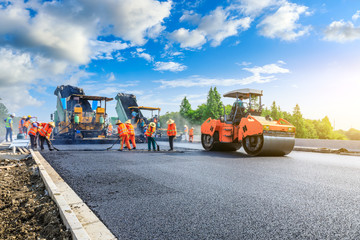Asphalt Driveway looks excellent, is less expensive than concrete, and is easier to maintain. They’re also quieter, absorbing engine and transmission noise from cars and trucks.
A well-maintained asphalt driveway can improve a home’s curb appeal and make for an effortless driving surface for vehicles. It can also protect a car’s tires from damage by providing a smooth surface. It is less expensive than concrete or pavers and can last decades with regular maintenance. However, like any paving material, it has its pros and cons.
Asphalt is a material that is mixed with aggregate materials to create roadways and other pavement surfaces. Its mixture is heated to create a durable, flexible material that can withstand the weight of cars and other vehicles. Asphalt is also resistant to freeze-thaw cycles and road salts, making it a good choice for harsh weather conditions.
Homeowners can choose from a variety of asphalt types depending on their needs. For example, if they plan to park heavy equipment, such as a trailer or boat, on their driveway, then a 41B asphalt type may be needed. This variety has a larger-sized rock and sand mixture with less oil than the 41A version.
Another option is permeable paving, which is becoming increasingly popular among homeowners due to its environmental benefits. Porous asphalt allows water to seep through the paved surface and filter into an underlying rock bed, thereby replenishing water tables. This type of paving is ideal for urban areas with high populations and reducing the amount of water runoff that can negatively impact local ecosystems.
An asphalt driveway’s durability and flexibility make it an attractive option for most homeowners. It is easier to install than a concrete driveway and, unlike pavers, it can be easily removed and replaced in the future if necessary. Its dark color also hides stains and marks better than concrete, requiring less frequent cleaning or maintenance.
The main drawback of asphalt is its susceptibility to oil and gas stains, which can be difficult to remove. It is also not the most environmentally friendly choice as it requires a lot of fossil fuels to produce, which contributes to greenhouse gases. For these reasons, many experts recommend using recycled asphalt when possible.
Bucket Asphalt
Asphalt is an affordable material that is ideal for residential driveways, parking lots and roads. It also requires less maintenance than concrete. A typical asphalt driveway will last up to 15 years if it is properly maintained and sealed every few years. Sealing your asphalt will protect it from the sun’s damaging UV rays, salt, oil and gasoline spills as well as heavy traffic. This will extend its lifespan and improve its appearance.
Asphalt emulsion sealer is the most effective product for sealing an asphalt driveway. It penetrates the surface to rejuvenate and strengthen it, while filling small cracks. It creates a black protective finish that prevents water penetration and freeze/thaw damage. It’s a good idea to use a rubber asphalt squeegee for spreading the sealant evenly over the entire surface.
Using the right tools can make the job go much faster and easier. One such tool is a pavement bucket that’s designed specifically for handling hot asphalt and other liquid materials. It has a safety lid to prevent spills and a handle at the bottom for easy gripping when pouring. A popular choice is the Roofmaster asphalt bucket, which can withstand temperatures of up to 400°F and features a large capacity to hold up to 10 gallons of liquid material.
It’s a good idea to clean your driveway before you apply the sealant. Thoroughly cleaning it will remove any dirt or debris and allow the sealant to adhere better. You should also repair any cracks or other damages to the surface before you seal it. If you don’t, these problems will only get worse over time.
Before you start applying the asphalt emulsion, be sure to stir it thoroughly. Continue to stir it throughout the application process to ensure even coverage. After it dries, you can drive on your newly-sealed asphalt driveway. If you’d like to prolong the life of your asphalt, you should consider getting a polymer modified asphalt slurry sealer. This will provide the same benefits of coal tar but is more environmentally friendly and produces fewer volatile organic compounds (VOC). It’s available in a variety of viscosities to match your project needs.
Hot Mix Asphalt
Hot mix asphalt, or HMA, is the type of asphalt that you’re most likely to see on the highways and streets around you. It’s made from a combination of aggregates (like crushed stone, gravel or sand) and asphalt binder that are heated and mixed together at the asphalt plant. Hot mix asphalt is designed to meet the unique needs of each paving project using specific combinations of aggregates and asphalt binder. The resulting mixture is then transported to the construction site, where it’s deposited and compacted to create a strong and durable surface.
The high temperature of the hot asphalt allows the binder to bond with the aggregates more firmly, making it an excellent choice for road construction projects that require a long-lasting pavement material. It’s also more flexible than concrete, which means that it can expand and contract with extreme weather changes without cracking or becoming damaged. This makes it an ideal material to use in climatic regions.
Because of its higher durability, hot mix asphalt can be used on high-traffic areas that need to withstand heavy vehicles and frequent traffic. It’s also more versatile than other paving materials, which means that it can be used in a variety of applications, from parking lots to interstate highways.
Another benefit of hot mix asphalt is that it cools down very quickly, which helps prevent the formation of potholes and other unwanted debris during paving projects. This feature also allows construction crews to reopen roads more quickly, cutting down on the amount of time that drivers must spend in bumper-to-bumper traffic.
In addition to its strength and flexibility, hot mix asphalt is environmentally friendly and highly recyclable. This is because it contains recycled aggregates, which help reduce the need to extract fresh raw materials. In fact, the majority of asphalt is recycled at least once in its lifecycle, making it one of the most sustainable paving materials available today.
Polymer-Modified Asphalt
The growth of traffic load in recent decades has significantly shortened the life of asphalt pavements, which leads to an increasing number and severity of pavement distresses and a significant increase in maintenance costs. To address these problems, the Highway agencies are looking to extend the life of asphalt pavements by modifying bituminous binders and by adding other additives. The most common modification method used is the addition of polymer to asphalt binders. The purpose of this is to achieve an enhancement in the rutting and thermal (cold-temperature) crack resistance properties of asphalt binder, as well as an improvement in the mixture durability.
This process involves incorporating the polymer into the binder through high shear mixing, allowing the polymer to be swallowed by the asphalt molecules. Once this happens, the asphalt and polymer form a swallowed micro-network that enhances the rheological engineering properties of the asphalt binder. This is done through the use of SBR latex polymers. TRCC has been involved in testing and characterization of these polymers to determine their effectiveness for this purpose. This information is then provided to the Departments of Transportation, contractors and asphalt suppliers to help them understand their specifications and performance.
It is important for the incorporated polymer to be compatible with the asphalt binder. This is determined by the polymer’s polarity, density, and molecular weight. It is also influenced by the morphology of the composite after the polymer is added and the blending technique employed. A major consideration is the effect of the incorporated polymer on the storage stability of the asphalt binder.
Incompatible combinations can cause the polymer to swell in relation to the asphalt binder. The swelling can influence the rheological properties of the asphalt, as it changes the distribution of the asphaltene molecules within the binder. This can lead to the formation of a thermodynamically unstable system in which the asphalt and polymer separate macroscopically.
The resulting polymer-asphalt mixtures are not as stable as unmodified asphalt, but they can still provide a good level of service. This is because the added elasticity allows for thinner layers of asphalt to be laid, while maintaining the same rheological characteristics of the mixture. Polymer-modified asphalts also have a lower moisture content, and therefore are less prone to stripping than unmodified materials.
